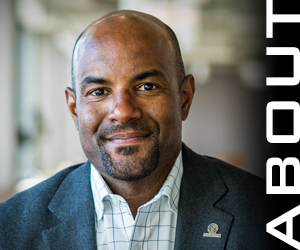CEO Outlook | Fall 2023
There’s More to DEI Than Race and Gender
Expanding the accounting profession’s dialogue surrounding diversity, equity, and inclusion is a business imperative.

Geoffrey Brown, CAE
President and CEO, Illinois CPA Society
Insights From Your President and CEO
There are many areas in my professional and personal life that I’m passionate about: Volunteerism, philanthropy, and running are just a few examples that come to mind. One that often stands out among the others is advocating for greater diversity, equity, and inclusion (DEI).
Throughout my career, I’ve always sought ways to drive conversations around DEI and facilitate actionable steps that organizations can put into motion. These actions have included offering scholarships, hosting educational programs on topics like implicit bias and why diversity matters, leading research about the state of diversity in the respective profession, conducting listening sessions with organizations and their affiliated professionals, and facilitating conversations designed to incent lasting change.
Within the accounting profession, DEI conversations have long been focused on race and gender. While these critical dimensions of diversity and identity often get the most attention when we discuss equity, inclusion, and belonging, there are other important DEI elements that must be accounted for if we truly want to better and benefit our workplaces.
Given the accounting profession’s current talent shortage, intentionally focusing on expanding DEI could lend a hand in mending the talent pipeline and driving business success. For instance, a new or renewed focus on a dimension like differing ability could prove beneficial; studies have found that ethnically and gender diverse organizations tend to be more profitable. Looking at a wider swath of diversity that includes neurodivergence could enable an organization to be more effective at solving problems and ultimately more impactful.
As we begin to broaden DEI beyond the confines of race and gender, we must be mindful to ensure that our organizational cultures align with the expectations of an increasingly more diverse and inclusive population. Without cultural alignment, recruitment and retention will almost certainly continue to challenge organizations. And while expanding DEI efforts will look different within every organization, what will be the same for all is that genuine intentionality and commitment are essential to the success of any DEI initiative.
I can assure you that there’s no one-size-fits-all approach to achieving meaningful DEI within your organization, let alone across the accounting profession. At a minimum, I implore those in positions of influence to champion change within their organizations by identifying which DEI dimensions are most viable and then determining appropriate metrics for measuring progress and success. Otherwise, it may be difficult to show that DEI is a real organizational priority or the business imperative that it’s becoming.
We all have important roles to play in expanding our views on diversity, reducing bias, and addressing the lack of inclusivity and equity in the accounting profession. I believe it’s important for professional communities like ours to prioritize creating spaces for conversations and programming across the spectrum of DEI. We must also acknowledge that expanding the dialogue surrounding this topic will be uncomfortable and challenging at times, but it’s what’s needed to keep the profession moving forward. Creating and sustaining a profession that’s relevant and welcoming to an increasingly diverse population and talent pipeline is essential. I invite you to join us in driving dialogue, seeking solutions, and enacting real, sustained change.
Related Content: